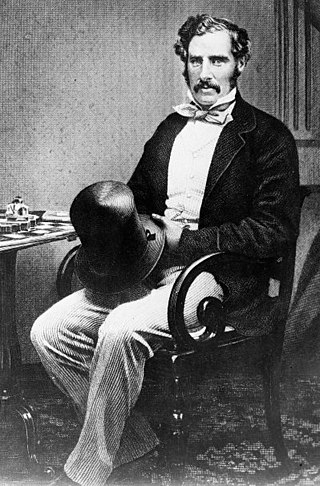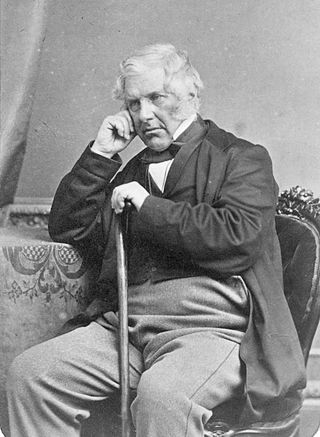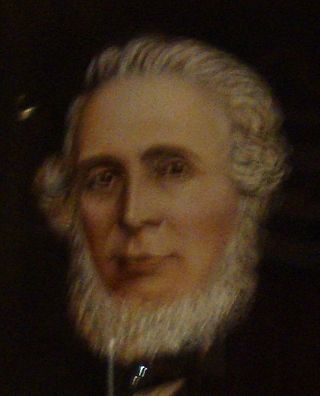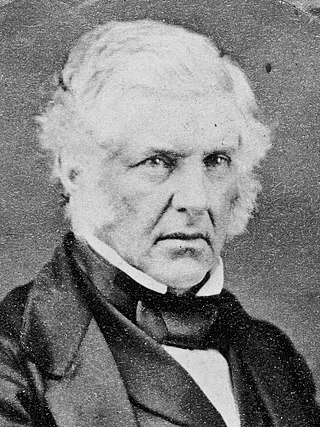Related Research Articles

Sir George Grey, KCB was a British soldier, explorer, colonial administrator and writer. He served in a succession of governing positions: Governor of South Australia, twice Governor of New Zealand, Governor of Cape Colony, and the 11th premier of New Zealand. He played a key role in the colonisation of New Zealand, and both the purchase and annexation of Māori land.

Sir Francis Dillon Bell was a New Zealand politician of the late 19th century. He served as New Zealand's third Minister of Finance, and later as its third Speaker of the House. The town of Bell Block near New Plymouth – on land Bell bought from the Puketapu iwi in 1849 – is named after him, as is Bell Street, Whanganui. Bell's son, Francis Henry Dillon Bell, became the first New Zealand born Prime Minister in 1925.
The 2nd New Zealand Parliament was a term of the Parliament of New Zealand. It opened on 15 April 1856, following New Zealand's 1855 election. It was dissolved on 5 November 1860 in preparation for 1860–61 election. The 2nd Parliament was the first under which New Zealand had responsible government, meaning that unlike previously, the Cabinet was chosen by Parliament rather than by the Governor-General of New Zealand.
Charles Brown was a New Zealand politician from the Taranaki area.

The 1879 New Zealand general election was held between 28 August and 15 September 1879 to elect a total of 88 MPs to the 7th session of the New Zealand Parliament. The Māori vote was held on 8 September. A total of 82,271 (66.5%) European voters turned out to vote, plus 14,553 Māori voters. Following the election, John Hall formed a new government.

Nelson Province was constituted in 1853 under the New Zealand Constitution Act 1852, and originally covered the entire upper South Island, including all of present-day Buller, Kaikoura, Marlborough, and Tasman districts, along with Nelson City, Grey District north of the Grey River, and the Hurunui District north of the Hurunui River. It was reduced in size by the creation of Marlborough Province in November 1859, then abolished in 1876, along with all the provinces of New Zealand.
The Taranaki Herald was an afternoon daily newspaper, published in New Plymouth, New Zealand. It began publishing as a four-page tabloid on 4 August 1852. Until it ceased publication in 1989, it was the oldest daily newspaper in the country.
Grey and Bell was a Taranaki electorate in the New Zealand Parliament from 1853 to 1881.
Dunedin Country was a parliamentary electorate in the rural area surrounding the city of Dunedin in Otago, New Zealand, from 1853 to 1860. It was a two-member electorate and was represented by a total of five members of parliament.
Christchurch was a parliamentary electorate in Christchurch, New Zealand. It existed three times. Originally it was the Town of Christchurch from 1853 to 1860. From the 1860–1861 election to the 1871 election, it existed as City of Christchurch. It then existed from the 1875–1876 election until the 1881 election. The last period was from the 1890 election to the 1905 election. Since the 1946 election, a similarly named electorate called Christchurch Central has been in existence.

The Sewell Ministry was the first responsible government in New Zealand. Unlike previous executives, its members were held accountable to Parliament. This would form the basis for future governments in New Zealand.
The 3rd New Zealand Parliament was a term of the Parliament of New Zealand. Elections for this term were held between 12 December 1860 and 28 March 1861 in 43 electorates to elect 53 MPs. Two electorates were added to this during this term, Gold Fields District and a new Dunedin electorate created by splitting the existing City of Dunedin into Dunedin and Suburbs North and Dunedin and Suburbs South, increasing the number of MPs to 57. During the term of this Parliament, six Ministries were in power.
John Lewthwaite was a 19th-century Member of Parliament in the Taranaki Region of New Zealand.

John Perry Robinson was the second Superintendent of the Nelson Province in New Zealand. His election came as a surprise, but he proved so popular that he won two subsequent elections with comfortable majorities. He remained Superintendent until his accidental drowning on the bar of the Buller River.

The 18th New Zealand Parliament was a term of the New Zealand Parliament. It was elected at the 1911 general election in December of that year.

The Christchurch Country by-election 1856 was a by-election held in the multi-member Christchurch Country electorate during the 2nd New Zealand Parliament, on 14 October 1856, and was, along with the Grey and Bell 1856 by-election, the second equal contested by-election in New Zealand political history.
The Grey and Bell by-election 1858 was a by-election held in the Grey and Bell electorate during the 2nd New Zealand Parliament, on 17 May 1858, and was, the second by-election in the electorate.

The 1865 Town of New Plymouth by-election was a by-election held in the Town of New Plymouth electorate during the 3rd New Zealand Parliament, on 19 May 1865. The by-election was caused by the resignation of the incumbent, Charles Brown, and was won unopposed by Henry Sewell. Whilst Sewell was not a local resident, he was a member of the government through his appointment to the Legislative Council, the upper house of Parliament. Sewell accepted the invitation to represent the electorate, as him becoming a member of the lower house was seen to strengthen the government.
References
- 1 2 "Election". Taranaki Herald . No. 220. 18 October 1856. p. 3. Retrieved 2 May 2013.